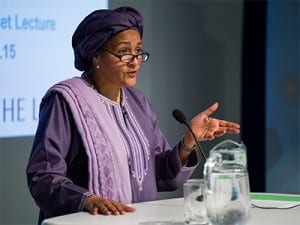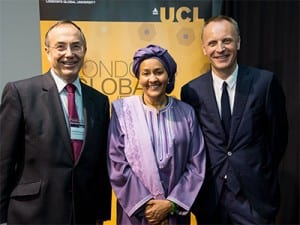2015 UCL Lancet Lecture with Amina J. Mohammed
By ucyow3c, on 16 November 2015
![]() Written by Hannah Sender, Project and Communications Officer, UCL Institute for Global Prosperity
Written by Hannah Sender, Project and Communications Officer, UCL Institute for Global Prosperity

Amina J. Mohammed addresses audience members
Last Thursday I listened to the annual UCL Lancet Lecture with Amina J. Mohammed, Special Adviser to UN Secretary-General Ban Ki-Moon on post-2015 development planning and recently sworn in Environment Minister in the Nigerian government.
I had planned to finish an article about her address to UCL staff and students the next day, Friday 13 November. I didn’t, and I returned to the article on Sunday 15 November. Between the time I began to write about Amina’s lecture and the time I restarted, at least 129 people were killed in a series of attacks in and on Paris. The day before, 43 people were killed in a suburb in Beirut. ISIS has claimed responsibility for both attacks.
Why bring this up? What does terrorism have to do with the Sustainable Development Goals (SDGs) – the subject of last Thursday’s lecture? What does the aftermath of those attacks have to do with the goals? From what I had learned while listening to Amina, the recently announced set of 17 goals and 169 associated targets have everything to do with Paris, Beirut and their aftermaths.
What the SDGs are designed to respond to, Amina told her audience, is the complexity of the world as an interconnected place. There are several ways the SDG agenda will do so: by encouraging inter-country cooperation and sharing of responsibilities, inter-scalar debates and interventions at the local, national and international levels, and interdisciplinary thinking unshackled by silos.
The SDGs bear down on complex issues that arise as crises in the common imagination, just as much as they do on the named subjects of the goals (poverty, climate change etc.). One audience member asked Amina about the effect of the migration crisis on ideas of global citizenship. Amina was sympathetic to people’s fear, but ultimately damming of neglectful behavior and blinkered approaches.
There are different kinds of factors at play here, and a failing on some countries’ behalf (Britain certainly seems to be implied here) to engage with the complex reasons why people leave on boats, in the back of lorries, and so on, to reach foreign shores.
Amina implied that in order to address an issue like the migration crisis, several conversations ought to happen: conversations between countries in order to understand the complex relationship between push and pull factors, parallel conversations between governments and their own citizens to deal with a lack of knowledge and prevalence of fear, and also conversations with countries whose situation and approach has been, for some reason, considered extraneous to the issue at hand.
Amina cites Tanzania, which has taken 8,000 to 9,000 migrants, but no one is asking them how they’re coping.
“This is where trust breaks down,” says Amina, “We have to have a conversation with everyone who is facing this.”
After the revelation that at least one of the Paris attackers has been found with a Syrian passport that had been flagged as arriving in Greece on a ‘typical refugee route’, the likelihood of fear-inspired reactions to the migrant crisis is difficult to overestimate.

UCL President & Provost Professor Michael Arthur,
Amina J. Mohammed and Dr Richard Horton
Moments of crisis such as this one can make international, government-to-citizen and citizen-to-citizen cooperation seem impossible, and threaten the foundation of trust on which progress is built. For Amina, however, debates about conflict and human rights should be integrated with the question of sustainable development. Indeed, without this consideration, the whole agenda would crumble.
Although we might well wonder whether recent events could throw the whole thing off, Amina’s steadfast determination still has the capacity to win doubters over. Her relative optimism has been hard-earned, and is grounded in the realities of personal experience and observation of development at work on a local level.
Amina began her lecture on Thursday with a set of three stories: the three births of her children in different hospitals in Nigeria. The experience of having her third child in a teaching hospital actually informs the sustainable development agenda, she said.
Although Amina places emphasis on the importance of strong institutions and governments that are able to put the measures for sustainable development in place, she is unbending on the need to involve everyone in the debate about and implementation of sustainable development initiatives, in a conversation that defies siloed thinking and harnesses all forms of knowledge.
The huge remit of the SDGs makes some people question whether it would be best to leave some of the debates (like terrorism) to another organisation or department in the UN, and whether it is best to accept that, in the name of sustainable development on a global scale, some people will have to be left out of the conversation. Surely it is best, they argue, to do one thing well, rather than fail across the board?
One audience member echoes these concerns, questioning whether the agenda will be too big, and therefore impossible to implement, if we really don’t leave anyone behind. Amina’s response is surprisingly economical: the agenda, she asserts, has become big precisely because we left people behind.
We had attempted to apply bandages to grave issues before, and the issues ballooned. If we don’t bring everyone into this conversation now, the agenda will only become less possible to achieve and more expensive.
I wonder what Amina really means when she talks about expense. It is clear that she is not only thinking about the costliness of implementing sustainable development measures now as opposed to 15 years down the line: that she is occupied with issues of human rights, marginalised people and unconsulted groups. But she also seems to be pointing to greater threats to sustainable development than economic cost.
If we continue to react to conflict of all kinds as we have previously done, we are at risk of continuing to drum up another ‘expense’: the deflating optimism and leadership we need to succeed at these goals.
Watch the 2015 UCL Lancet Lecture with Amina J. Mohammed in full:
Henrietta Moore, the Director of the UCL Institute for Global Prosperity (IGP), is determined not to let that optimism and leadership leave us. In the wake of the official adoption of the SDGs, Amina’s Lancet Lecture and the attacks in Paris and Beirut, the IGP is hosting Countdown 2030 – a different kind of conference that engages the academic community with the next generation’s leaders on sustainable development.
Held in two different locations on the same day – Saturday 28 November – we will discuss the roadmap to 2030 (the deadline year for the SDGs) with young entrepreneurs of sustainable designs, innovative researchers and youth activists. Be a part of the conversation and visit the IGP website to see the agenda for the Bloomsbury Sessions and the East London Sessions, and to register.
 Close
Close

